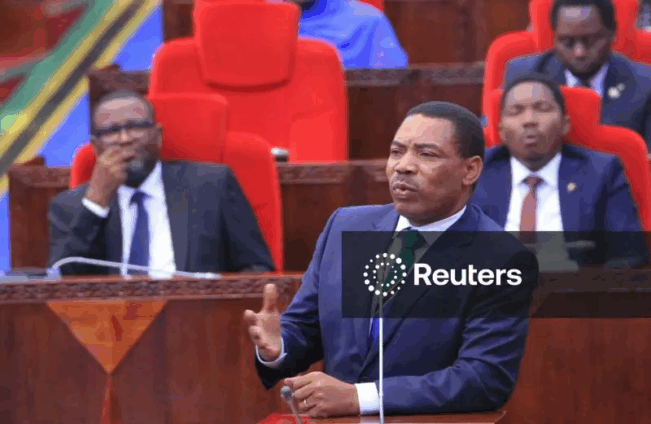Tanzania Election Turmoil: President Names PM Amidst Disputed 98% Vote Controversy

Tanzania has recently been at the center of international scrutiny following a presidential election that saw incumbent President Samia Suluhu Hassan declared the winner with an astonishing 98% of the vote. This overwhelming victory, announced after the October 29 election, has been widely disputed by opponents and human rights groups, leading to significant political unrest and a concerning human rights situation in the East African nation.
In the wake of the election, President Hassan, who has been in office since 2021 following the death of her predecessor John Magufuli, appointed Mwigulu Nchemba, a longtime loyalist and former finance minister, as the new prime minister. Nchemba's appointment was backed by parliament in a near-unanimous vote, a predictable outcome given the declared landslide victory. He has also served in Magufuli's cabinet and held posts within the ruling Chama Cha Mapinduzi (CCM) party, signifying President Hassan's trust, as he has maintained his cabinet position through previous reshuffles.
The legitimacy of the 98% election result has been severely questioned, with critics branding it as an insult to democratic principles and the intelligence of the citizenry. Observers argue that such a figure is unattainable in a genuine democracy with real choices, suggesting that the election was a "coronation" rather than a fair contest. Reports indicate that major opposition rivals were systematically disqualified on dubious technicalities or jailed on fabricated charges even before the campaign period began, effectively dismantling any meaningful competition.
The period surrounding the election was marred by widespread clashes and violence. Rights groups, opposition parties, and human rights activists have reported a high death toll among protesters. The U.N. Human Rights Office stated its belief that hundreds of people were killed, while the main opposition party and some activists claimed security forces killed more than 1,000 individuals. The government, while denying the opposition's figures as exaggerated, has not provided its own official count of the deceased. President Hassan has consistently rejected criticism of her government's human rights record and defended the fairness of the election, despite the mounting evidence to the contrary.
Further exacerbating the suppression of dissent, reports indicate that the government implemented a complete internet blackout during and after the election. This move is seen not as a technical issue but as a deliberate act to silence witnesses, prevent the spread of information, and bury the truth before it could reach the outside world. Critics argue that such actions are choreographed displays of state control, designed to remind citizens that power emanates from the state, not the people.
Amidst this political turmoil, Tanzania has projected an economic growth of 6% for the current year, primarily driven by investments in infrastructure projects such as roads, railways, and power generation. Budget spending is expected to increase by approximately 12% to fund these initiatives, even as the country faces cuts in aid from international partners, including the United States. This economic outlook contrasts sharply with the country's deteriorating democratic and human rights environment.
Tanzania's situation is not an isolated incident but rather indicative of a broader and troubling pattern across the African continent. Many nations are experiencing a "slow suffocation of democracy through democratic means," where leaders, often fluent in democratic rhetoric, perpetuate authoritarian rule. Examples include Paul Biya in Cameroon (ruling since 1982), Teodoro Obiang in Equatorial Guinea (in power since 1979), and Denis Sassou Nguesso in Congo-Brazzaville (governing for four decades). In these contexts, elections function as "coronations" – tightly scripted rituals designed to legitimize predetermined outcomes rather than genuinely reflect the will of the people.
This erosion of true democracy carries profound consequences. Citizens, witnessing their votes consistently rendered meaningless and protests met with violence, begin to lose faith in democratic ideals. The alarming trend of young people in West and Central Africa (e.g., Mali, Burkina Faso, Guinea, Gabon) celebrating military coups is seen as a desperate reaction to the failures of "fake democracies." For them, a military takeover, however problematic, offers a perceived end to prolonged periods of unrepresentative and repressive civilian rule.
The international community's response has also drawn criticism. While Western governments often issue statements of "deep concern," these words frequently fail to translate into concrete action to stop repression or free political prisoners. Critics argue that global powers often prioritize stability, even if it is violent and repressive, over genuine freedom and democracy, especially when economic interests (e.g., profitable contracts, mineral flow, open ports) are at stake. This perceived hypocrisy further emboldens authoritarian regimes and undermines the credibility of democratic advocacy.
Ultimately, Tanzania's 98% election result symbolizes a deeper tragedy: the hijacking of democracy by elites who master its vocabulary while betraying its spirit. True democracy, it is argued, is not merely about holding elections but about accountability, fairness, and human dignity. The violence and suppression in Tanzania send a dangerous message that elections are meaningless, power is permanent, and justice is optional. When peaceful change becomes impossible, the seeds of instability are sown, potentially leading to future unrest. The silence and inaction of the world, therefore, are not benign but actively contribute to the normalization of tyranny, where numbers like 98% cease to be outliers and become the new, tragic normal for Africa's surrender of true democratic ideals.
You may also like...
If Gender Is a Social Construct, Who Built It And Why Are We Still Living Inside It?

If gender is a social construct, who built it—and why does it still shape our lives? This deep dive explores power, colo...
Be Honest: Are You Actually Funny or Just Loud? Find Your Humour Type

Are you actually funny or just loud? Discover your humour type—from sarcastic to accidental comedian—and learn how your ...
Ndidi's Besiktas Revelation: Why He Chose Turkey Over Man Utd Dreams

Super Eagles midfielder Wilfred Ndidi explained his decision to join Besiktas, citing the club's appealing project, stro...
Tom Hardy Returns! Venom Roars Back to the Big Screen in New Movie!

Two years after its last cinematic outing, Venom is set to return in an animated feature film from Sony Pictures Animati...
Marvel Shakes Up Spider-Verse with Nicolas Cage's Groundbreaking New Series!

Nicolas Cage is set to star as Ben Reilly in the upcoming live-action 'Spider-Noir' series on Prime Video, moving beyond...
Bad Bunny's 'DtMF' Dominates Hot 100 with Chart-Topping Power!

A recent 'Ask Billboard' mailbag delves into Hot 100 chart specifics, featuring Bad Bunny's "DtMF" and Ella Langley's "C...
Shakira Stuns Mexico City with Massive Free Concert Announcement!

Shakira is set to conclude her historic Mexican tour trek with a free concert at Mexico City's iconic Zócalo on March 1,...
Glen Powell Reveals His Unexpected Favorite Christopher Nolan Film

A24's dark comedy "How to Make a Killing" is hitting theaters, starring Glen Powell, Topher Grace, and Jessica Henwick. ...





